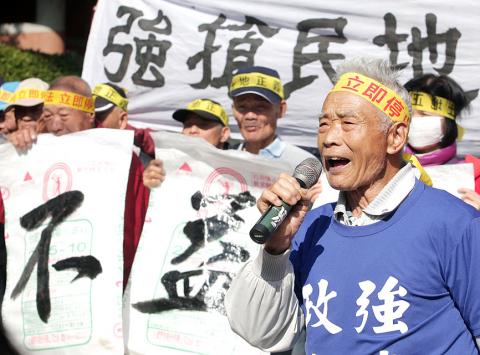Dozens of farmers from Hsinchu County’s Jhubei Township (竹北) yesterday rallied in front of the Council of Agriculture in Taipei, urging the council to reject the planned Taiwan Knowledge-Based Economy Park (臺灣知識經濟旗艦園區), as it would deprive them of their farmland.
Previously named the Puyu (璞玉) Development Project, the renamed economy park project was approved by the Ministry of the Interior in 2009 and would cover an area of about 447 hectares — nearly 400 hectares of which will be acquired through expropriation.
The self-help association consisting of residents that are facing possible loss of their lands said that based on the council’s data, more than 80 percent of the land that would be expropriated is in a special agricultural district, and good quality farmland should be protected.

Photo: CNA
The farmers held a hand-written banner that read: “Robbing the people of their land. Being oppressed by government officials, the public is forced to revolt against them.”
They questioned the project’s necessity and asked the council to reject the project, saying it would not benefit public interests.
They said that under the plan, 33 hectares of the expropriated land would become a part of National Chiao Tung University, but the Ministry of Education had announced in 2011 that it was postponing development due to financial problems.
In addition, they said that the amended Land Expropriation Act (土地徵收條例) stipulates that state construction projects must gain the Cabinet’s approval to expropriate lands in special agricultural districts, but the review process for the project has been made only at the local government level.
“The farmlands in the area are all of good quality, without pollution. If the council is not the voice of the farmers, shouldn’t it be dissolved?” association chairman Chiu Hung-chun (邱鴻鈞) asked.
“We don’t want our lands to be confiscated. We cannot endure having land that has been passed down from our ancestors sold for no reason,” association vice chairman Chen Yi-hsu (陳義旭) said.
With his farmland now facing potential expropriation for a second time, Tien Shou-shi (田守喜), whose rice crop just won the silver medal for quality last year, said the council should be responsible for protecting good farmlands.
While the council says it wants to improve the nation’s food self-sufficiency rate, it is not willing to stand on the farmers’ side and help them protect their land, Tien added.
In response, Chuang Yu-wen (莊玉雯) of the council’s planning department, said that the council would convey the farmers’ opinions to the review committee in future meetings.

Chinese Nationalist Party (KMT) Chairman Eric Chu (朱立倫), spokeswoman Yang Chih-yu (楊智伃) and Legislator Hsieh Lung-chieh (謝龍介) would be summoned by police for questioning for leading an illegal assembly on Thursday evening last week, Minister of the Interior Liu Shyh-fang (劉世芳) said today. The three KMT officials led an assembly outside the Taipei City Prosecutors’ Office, a restricted area where public assembly is not allowed, protesting the questioning of several KMT staff and searches of KMT headquarters and offices in a recall petition forgery case. Chu, Yang and Hsieh are all suspected of contravening the Assembly and Parade Act (集會遊行法) by holding

PRAISE: Japanese visitor Takashi Kubota said the Taiwanese temple architecture images showcased in the AI Art Gallery were the most impressive displays he saw Taiwan does not have an official pavilion at the World Expo in Osaka, Japan, because of its diplomatic predicament, but the government-backed Tech World pavilion is drawing interest with its unique recreations of works by Taiwanese artists. The pavilion features an artificial intelligence (AI)-based art gallery showcasing works of famous Taiwanese artists from the Japanese colonial period using innovative technologies. Among its main simulated displays are Eastern gouache paintings by Chen Chin (陳進), Lin Yu-shan (林玉山) and Kuo Hsueh-hu (郭雪湖), who were the three young Taiwanese painters selected for the East Asian Painting exhibition in 1927. Gouache is a water-based

Taiwan would welcome the return of Honduras as a diplomatic ally if its next president decides to make such a move, Minister of Foreign Affairs Lin Chia-lung (林佳龍) said yesterday. “Of course, we would welcome Honduras if they want to restore diplomatic ties with Taiwan after their elections,” Lin said at a meeting of the legislature’s Foreign Affairs and National Defense Committee, when asked to comment on statements made by two of the three Honduran presidential candidates during the presidential campaign in the Central American country. Taiwan is paying close attention to the region as a whole in the wake of a

OFF-TARGET: More than 30,000 participants were expected to take part in the Games next month, but only 6,550 foreign and 19,400 Taiwanese athletes have registered Taipei city councilors yesterday blasted the organizers of next month’s World Masters Games over sudden timetable and venue changes, which they said have caused thousands of participants to back out of the international sporting event, among other organizational issues. They also cited visa delays and political interference by China as reasons many foreign athletes are requesting refunds for the event, to be held from May 17 to 30. Jointly organized by the Taipei and New Taipei City governments, the games have been rocked by numerous controversies since preparations began in 2020. Taipei City Councilor Lin Yen-feng (林延鳳) said yesterday that new measures by